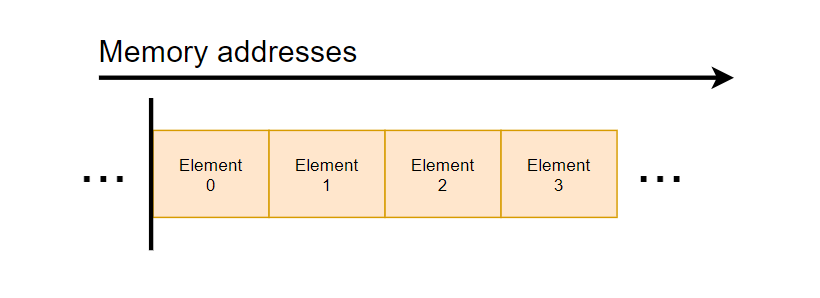Defined in: <vector>
Overview
- Simplified
- Detailed
template< typename T, /* ... */ >
class vector;
- Regular
- Polymorphic (since C++17)
template<
class T,
class Allocator = std::allocator<T>
> class vector;
namespace pmr {
template< class T >
using vector = std::vector<T, std::pmr::polymorphic_allocator<T>>;
}
std::vector is a container that encapsulates dynamic size arrays.
Memory
The elements are stored contiguously, one after another.
This means that a pointer to an element of a vector may be passed to any function
that expects a pointer to an element of an array.

Storage size
The storage of the vector is handled automatically, being expanded and contracted as needed.
Vectors usually occupy more space than static arrays, because more memory is allocated
to handle future growth. This way a vector does not need to reallocate each time an element
is inserted, but only when the additional memory is exhausted. The total amount of allocated
memory can be queried using capacity() function.
Extra memory can be returned to the system via a call to shrink_to_fit() (od C++11)
Reallocations are usually costly operations in terms of performance.
The reserve() function can be used to eliminate reallocations
if the number of elements is known beforehand.
Technical details
Complexity
Named requirements
Template type requirements
std::vector
| Defined in | vector |
Template parameters
See technical details for more detailed information.
| pub | T | Type of the elements. |
| pub | Allocator | Allocator that is used to acquire/release memory and to construct/destroy the elements in that memory. |
Type names
| pub | value_type | T |
| pub | allocator_type | Allocator |
| pub | size_type | Unsigned integer type (usually std::size_t) |
| pub | difference_type | Signed integer type (usually std::ptrdiff_t) |
| pub | reference | value_type& |
| pub | const_reference | value_type const& |
| pub | pointer | Allocator::pointer (do C++11)std::allocator_traits<Allocator>::pointer (od C++11) |
| pub | const_pointer | Allocator::const_pointer (do C++11)std::allocator_traits<Allocator>::const_pointer (od C++11) |
| pub | iterator |
|
| pub | const_iterator |
|
| pub | reverse_iterator | std::reverse_iterator<iterator> |
| pub | const_reverse_iterator | std::reverse_iterator<const_iterator> |
Member functions
| pub | (constructors) | Constructs a vector. |
| pub | (destructor) | Destroys the vector, deallocating internal storage if used. |
| pub | operator= | Assigns values to the container. |
| pub | assign | Assigns values to the container. |
| pub | get_allocator | Returns the associated allocator. |
Element access
| pub | at | Accesses a specified element with bounds checking. |
| pub | operator[] | Accesses a specified element. |
| pub | front | Returns the first element. |
| pub | back | Returns the last element. |
| pub | data | Returns a pointer to the first element of the underlying array. |
Iterators
| pub | begin cbegin (od C++11) | Returns an |
| pub | end cend (od C++11) | Returns an |
| pub | rbegin crbegin (od C++11) | Returns a reverse |
| pub | rend crend (od C++11) | Returns a reverse |
Capacity
| pub | empty | Returns |
| pub | size | Returns the number of elements. |
| pub | max_size | Returns the maximum possible number of elements. |
| pub | reserve | Reserves storage. |
| pub | capacity | Returns the number of elements that can be held in currently allocated storage. |
| pub | shrink_to_fit (od C++11) | Reduces memory usage by freeing unused memory. |
Operations
| pub | clear | Clears the contents. |
| pub | insert | Inserts elements. |
| pub | emplace (od C++11) | Constructs elements in-place. |
| pub | erase | Removes elements. |
| pub | push_back | Appends an element to the end. |
| pub | emplace_back (od C++11) | Constructs elements in-place at the end. |
| pub | pop_back | Removes the last element. |
| pub | resize | Changes the number of elements stored. |
| pub | swap | Swaps the contents. |
Non-member functions
| pub | operator== operator!= (removed in C++20) operator< (removed in C++20) operator> (removed in C++20) operator<= (removed in C++20) operator>= (removed in C++20) operator<=> | Lexicographically compares the values in the vector. |
| pub | std::swap (std::vector) | An overload for a std::swap algorithm. |
| pub | erase (std::vector) erase_if (std::vector) | Overloads for std::erase/std::erase_if algorithms. |
Deduction guides (since C++17)
Click to expand
Examples
Basic usage
Calculate arithmetic mean
#include <iostream>
#include <vector>
auto main() -> int
{
auto const numbers = std::vector<double>{
5, 2.4, 3.2, 1.8, 4.6,
3.1, 2.9, 4.7, 3.8, 2.2,
};
auto sum = 0.0;
for (auto number : numbers) {
sum += number;
}
auto const mean = sum / numbers.size();
std::cout << "Mean: " << mean << '\n';
}
Mean: 3.37
Find the maximum element
#include <iostream>
#include <string>
#include <algorithm>
auto main() -> int
{
auto const numbers = std::vector<int>{
5, 2, 8, 1, 14, 3, 2, 10, 3, 2
};
auto const max_it = std::max_element(
numbers.begin(),
numbers.end()
);
auto const max_index = std::distance(numbers.begin(), max_it);
std::cout << "Max: " << *max_it << " at index: " << max_index;
}
Max: 14 at index: 4
Erase nth element
#include <iostream>
#include <vector>
#include <string>
auto main() -> int
{
auto player_names = std::vector<std::string>{
"Sad Crab", "Happy Wolf", "Angry Panda",
"Wicked Witch", "Crazy Clown", "Funny Monkey",
};
auto const n = 2; // arbitrary, 0-based index
// Erase the nth element ("Angry Panda")
player_names.erase(player_names.begin() + n);
for (auto const& name : player_names) {
std::cout << name << '\n';
}
}
Sad Crab
Happy Wolf
Wicked Witch
Crazy Clown
Funny Monkey
Hover to see the original license.